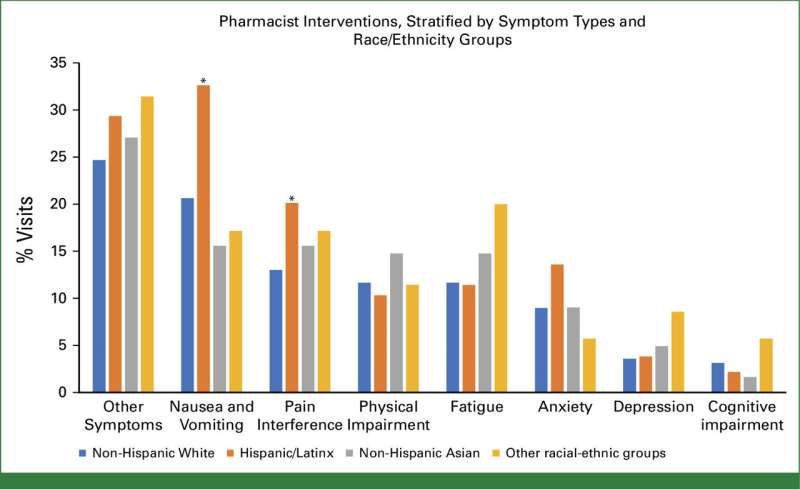This article has been reviewed according to Science X's editorial process and policies. Editors have highlighted the following attributes while ensuring the content's credibility:
fact-checked
trusted source
proofread
Electronic patient-reported outcome tool reduces cancer care disparities

A University of California, Irvine, research team has developed and implemented an intervention to enhance cancer care support services for racial and ethnic minority patients undergoing chemotherapy.
The electronic patient-reported outcome tool is a web-based application that allows individuals to enter their health data into a smartphone, tablet or computer. In this study, the ePRO was available in multiple languages and coupled with digital analytics. At each treatment visit, participants digitally recorded and submitted their symptoms and side effects, enabling oncology pharmacists to conduct real-time assessments and proactively intervene.
Published online July 15 in the journal JCO Oncology Practice, UC Irvine's ePRO trial was conducted between July 2021 and June 2023, with a focus on newly diagnosed adult cancer patients receiving intravenous anticancer therapies.
Researchers found that Hispanic and Asian participants reported higher levels of pain, nausea and vomiting compared to non-Hispanic white patients and were also more frequent visitors to urgent care centers for their symptoms.
"Racial and ethnic disparities significantly affect symptom burden and severity, but early recognition of health issues is often hindered by patients' limited health literacy or poor communication due to language barriers," said Alexandre Chan, corresponding author and UC Irvine chair and professor of clinical pharmacy practice.
"To address these challenges, it's crucial to develop innovative solutions that enhance treatment strategies tailored to each person's specific needs. By leveraging technology and the specialized knowledge of oncology pharmacists, we can help create a more equitable health care system."
The study, led by oncology pharmacists, was conducted at the UCI Health Chao Family Comprehensive Cancer Center in Orange. A total of 250 people were enrolled: 42.4% of them non-Hispanic white, 30.8% Hispanic and 20.4% non-Hispanic Asian.
They reported symptoms at each visit, with nausea and vomiting being the most common, followed by pain and fatigue. Results were reviewed by oncology pharmacists who provided personalized treatment and counseling, and 90% of the patients expressed satisfaction across all visits.
"Past studies have utilized ePRO for symptom management in cancer patients, but they were primarily implemented in mostly non-Hispanic white populations and seldom involved pharmacists," Chan said.
"By reducing language barriers, using real-time analytics and allowing pharmacists to provide timely and personalized symptom management, our approach shows the potential to facilitate patient-centered care for accurate and effective interventions, to minimize adverse effects and to improve health outcomes."
More information: Alexandre Chan et al, Electronic Patient-Reported Outcome-Driven Symptom Management by Oncology Pharmacists in a Majority-Minority Population: An Implementation Study, JCO Oncology Practice (2024). DOI: 10.1200/OP.24.00050


















